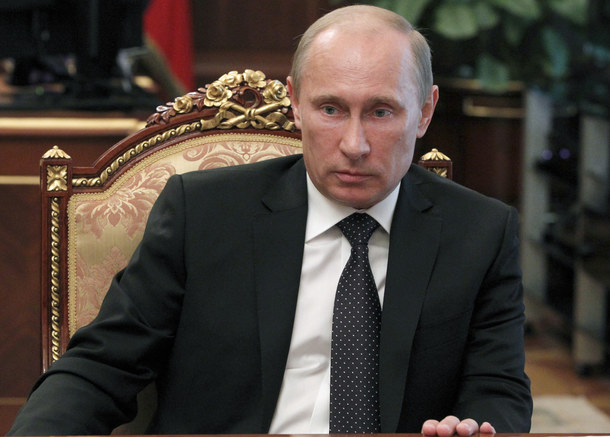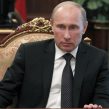
Policy-Making in the Kremlin Is Shaped by Delusions and Fears
Publication: Eurasia Daily Monitor Volume: 9 Issue: 139
By:

Last Thursday, President Vladimir Putin held a meeting with the leaders of the parties represented in the State Duma and responded to the official opposition’s very delicate reservations with the affirmation that “we have made absolutely the right decisions,” but their implementation would be reasonably flexible. What was more surprising were the words about having no fear of democracy and proceeding with liberal political reforms and granting opportunities to form new political parties instead of “running around the squares” (Moskovskie Novosti, July 20). These deliberations are so detached from the political reality of “tightening the screws” and selective repressions against the “white” opposition that observers are left wondering where this need for doublespeak comes from (Kommersant, July 20). For all intents and purposes, Putin is reversing his junior partner Dmitry Medvedev’s policy of symbolic liberalization, but he is also trying to assert his leadership in modernizing the country, even if the notion of “modernization” is distinctly disagreeable to him.
The rush of new legislation targeting free media, NGOs, the Internet and even volunteer work constitutes the main content of this curtailing of democratic freedoms. But it is the persecution of three young women from the Pussy Riot punk group that has become the focal point of Putin’s obscurantism. Their provocative performance in the Christ the Savior Cathedral was perhaps not in good taste and offended many believers, but the vindictiveness of the politically driven criminal investigation has shifted public opinion in their favor. Now in Moscow, 50 percent of respondents express support for them, while only 36 percent want to see the members of Pussy Riot punished (Levada.ru, July 20). Many find the pseudo-religious zeal of the prosecution disgusting and are impressed with the dignity shown by Maria Alekhina, Yekaterina Samutsevich and Nadezhda Tolokonnikova (Novaya Gazeta, July 20). Many more in the intellectual and even bureaucratic elite are worried that this experiment with the revival of medieval inquisition proves the irreversible degradation of the sultanistic system of power heretofore in place in Russia (Moscow Echo, July 20).
Putin obviously does not see the dangerous resonance of his order to stage a “show trial” over the defiant “blasphemers,” while admitting that his careful analysis informs that “the situation in our country is far from ideal.” A tragic confirmation of this understatement was delivered on the day of Putin’s meeting with the parliamentarians, when Ildus Fayzov, the chief mufti of the Muslim community of Tatarstan, was wounded by a car bomb and his deputy, Valiulla Yakupov, was gunned down (Nezavisimaya Gazeta, July 20). The terrorist attack came as a shock for Putin, who assured that “we are aware of the situation in particular regions” and mentioned the lack of “preventive measures,” though, ironically, anti-terrorist exercises were scheduled in Kazan for that day (Moskovsky Komsomolets, July 20). The fact is that the Kremlin had preferred to ignore the brewing conflict in Tatarstan caused by the radicalization of many Islamic groups, much the same way as it pretends that ambushes and explosions in Dagestan and other republics of the North Caucasus are just a feature of the local lifestyle.
What Putin finds difficult to ignore and impossible to sort out are economic problems, which determine the inevitability of budget cuts, including – against his strictest orders – in the rearmament program (Vedomosti, July 19). He has a perfectly good grasp of the workings of various “shadowy” money flows and budget re-distribution schemes but cannot understand why so much money is flowing out of the country despite his persistent attempts to lure investors in. Not content with leaving the economic matters to Medvedev’s government, Putin has created a 30-headed Economic Council, which held its first meeting last Friday (Forbes.ru, July 17). Experts duly suggested various ways of explaining away Russia’s economic sluggishness by attributing it to European and US financial mismanagement and even proposed to put a bit of a scare into those too willing to evacuate their capital (RBC Daily, July 20). Much was said about the possible impact of China’s slowdown, but Putin connected with the topic in his own way, reflecting on the singularity that the leader is stepping down and giving up the levers of control (Kommersant, July 21).
In Putin’s mindset, this is indeed an anomaly that goes contrary to the fundamental logic of his system of power, which works through all-penetrating and ever-deepening corruption covered up by the chairman who must provide popular legitimacy for the mega-racket but can never step down (Forbes.ru, July 16). He finds it much easier to empathize and even identify with the plight of the heavy-handed Syrian President Bashar al-Assad. Consequently, the Russian leader refuses to shift his rigid stance on the Syrian civil war even after his recent meeting with Turkish Prime Minister Recep Tayyip Erdogan, who is Russia’s most valuable ally in the region and a peer with whom Putin seeks to preserve a particular personal chemistry (Kommersant, July 19). It was one of those incredible coincidences that the explosion in Damascus that killed Syrian Defense Minister Daoud Rajha and several other high-level officials happened exactly when Putin and Erdogan had their uneasy conversation – and within 24 hours of the bombing attack in Kazan.
This certainly does not signify that Putin’s regime is facing the prospect of a violent uprising, but it points to the propensity of all “enlightened” authoritarian regimes to corrupt themselves to complete degradation and illuminates the odd duality of thinking in the ruling elite. Putin’s courtiers exhibit confidence in their control over such minor annoyances as the street protests, yet they cannot hide their panic about the potential for the next rallies. They demonstrate a readiness to set a strategic course for “business-as-usual” for years to come and communicate openly their fears that the system of bureaucratic predation has turned against itself and is breaking down faster than they can cash out their stakes and escape to “safe havens” in Europe (Gazeta.ru, July 19). The senselessness of constant fine-tuning of long-term plans is becoming increasingly evident even for the professional policy-managers. However, the fears of imminent collapse are beginning to come true nonetheless. Over the next several months, it will become ever clearer that selective repressions and “show trials” are mobilizing rather than frightening the opposition. Whereas, each potential candidate for the expanded Magnitsky list will need to sign on fully with the ruling regime or opt out of public life entirely.




